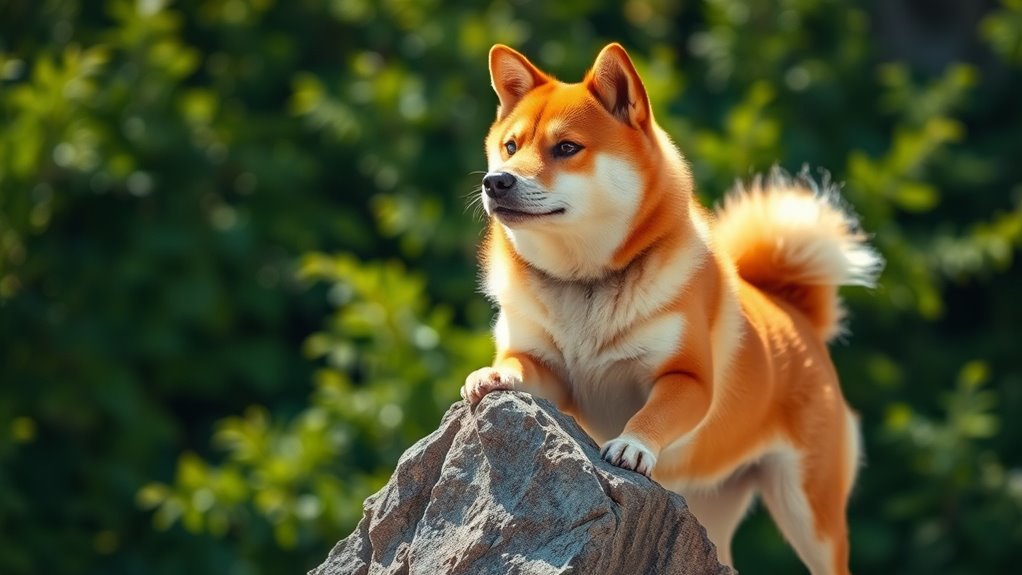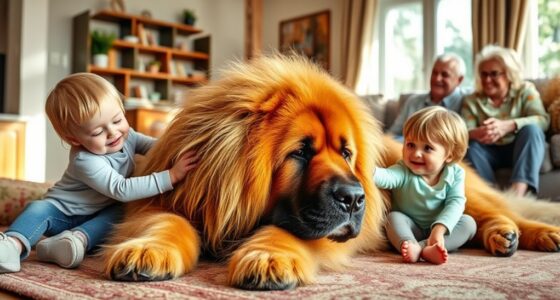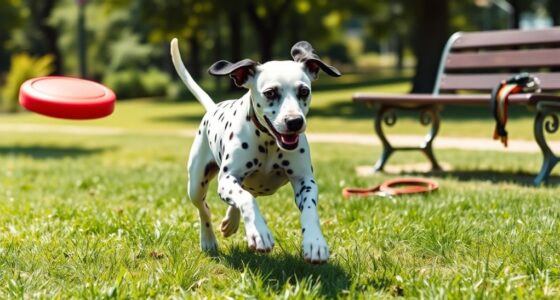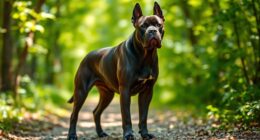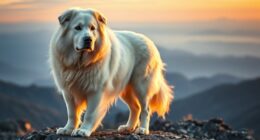The Shiba Inu’s independent nature comes from centuries of being a self-reliant hunter and survival breed in Japan. They’re confident, alert, and often prefer exploring alone, which can make training and socialization a bit challenging. Their history shapes their aloof and resilient personality, valuing personal space and autonomy. If you want to understand how to live harmoniously with this self-sufficient breed, discover more about their traits and how to nurture their spirit.
Key Takeaways
- Shiba Inu’s independence stems from their ancient role as solo hunting dogs in Japan.
- They exhibit a confident, aloof demeanor, valuing personal space and self-reliance.
- Their strong-willed nature requires patient training and respect for boundaries.
- Their history fosters resilience, adaptability, and problem-solving abilities.
- Their autonomous traits influence their preference for solitary activities and minimal dependence.
The Origins of the Shiba Inu and Its Self-Reliant Roots
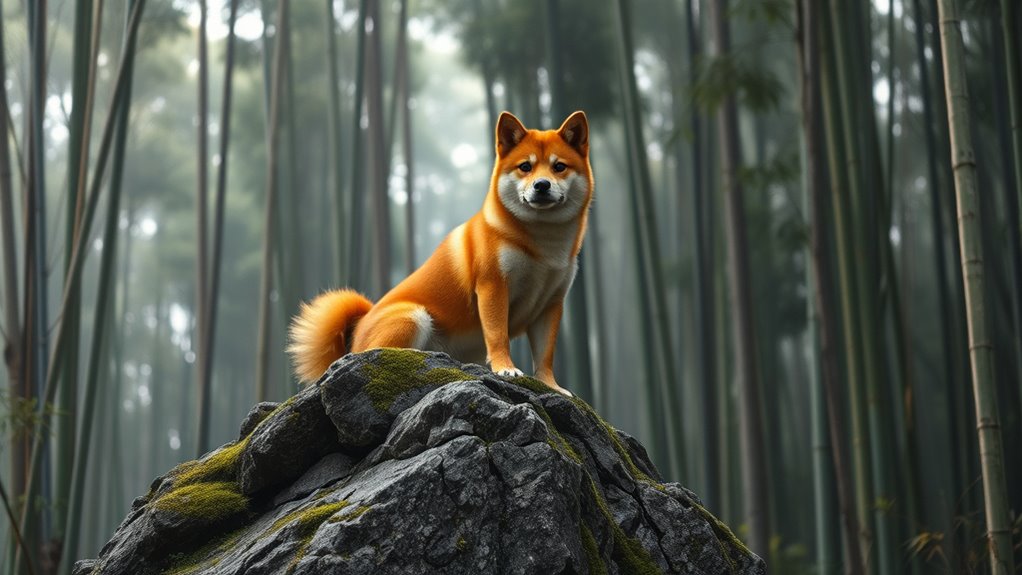
The Shiba Inu’s origins trace back over a thousand years to Japan, where these small, agile dogs were bred for hunting small game in rugged terrain. During historical hunting, they demonstrated remarkable independence and alertness, traits essential for tracking and catching prey in tough environments. Over time, these qualities earned the Shiba Inu a special place in Japanese culture, transforming it into a symbol of loyalty and perseverance. They embody the resilience and self-reliance that have been valued in Japanese society for generations. As a result, the Shiba Inu’s role extended beyond hunting, becoming a cherished cultural icon. Their history reflects a deep-rooted connection to Japan’s traditions, emphasizing their innate independence and adaptability. Additionally, their independent nature has helped them thrive in various living situations, making them a popular choice for those seeking a self-reliant companion. This self-reliance also contributes to their reputation for being relatively low-maintenance pets.
Key Traits That Define the Shiba Inu’s Independence
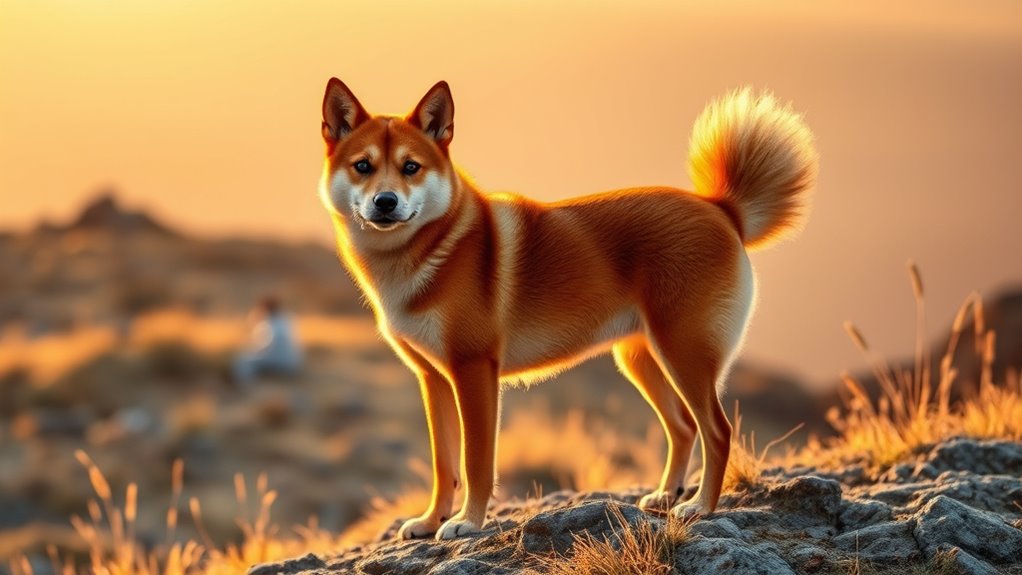
You’ll notice that Shiba Inus are remarkably self-reliant and confident in their actions. Their strong-willed nature means they often make decisions independently, without needing constant guidance. Recognizing these traits helps you understand what truly sets the Shiba Inu apart as an independent breed. Additionally, their ability to adapt to various environments demonstrates their independent nature and resilience. This adaptability is complemented by their capacity to exfoliate and maintain healthy skin, reflecting their overall robust and self-sufficient characteristics. Their understanding of home essentials further showcases their ability to thrive in different living situations and maintain their well-being. Moreover, their engagement with automation in business reflects their capacity to adapt and thrive in changing environments. Their resourcefulness in managing their environment highlights their innate problem-solving skills, which contributes to their reputation as an autonomous breed.
Self-Reliance in Behavior
Because of their innate independence, Shiba Inus demonstrate remarkable self-reliance in their behavior. They often prefer exploring on their own and making decisions without constant guidance, reflecting their cultural symbolism as symbols of resilience and loyalty in Japan. This breed’s popularity has grown worldwide partly due to these traits, as owners admire their confident and autonomous nature. You’ll notice they can entertain themselves and adapt to new environments with minimal assistance. Their self-reliance means they might not always seek your attention but still form strong bonds. This independence is a core part of their identity, making them unique among dog breeds. Understanding this trait helps you appreciate their self-sufficient attitude and respect their natural inclination to be confident and autonomous. Additionally, their high energy levels require owners to provide adequate mental and physical stimulation to keep them happy and healthy. Recognizing their independent nature can help owners develop effective training and bonding strategies that respect their personality. Furthermore, their cultural symbolism as resilient and loyal in Japan underscores the importance of respecting their boundaries and fostering mutual trust.
Strong-Willed Temperament
A strong-willed nature lies at the heart of the Shiba Inu’s independence, shaping their confident and determined attitude. You’ll notice their stubborn streak during dog grooming, as they resist commands or grooming routines, reflecting their independent spirit. This breed comparison highlights their self-assured attitude compared to more obedient breeds. Their resolve can make training challenging but rewarding. You must be patient and consistent to earn their trust and cooperation. Recognizing their strong will helps you understand their needs and boundaries. Key traits include:
- High confidence and stubbornness
- Desire for autonomy during interactions
- Resistance to commands without firm leadership
- Need for mental stimulation and respect
- Understanding their independent nature is essential for building a balanced relationship with your Shiba Inu. Additionally, respecting their self-reliance fosters mutual trust and helps prevent behavioral issues. Developing a training approach tailored to their temperament ensures a positive experience for both owner and dog. Being aware of their high confidence can help you set appropriate boundaries and maintain a harmonious bond.
How the Breed’s History Shapes Its Behavior Today
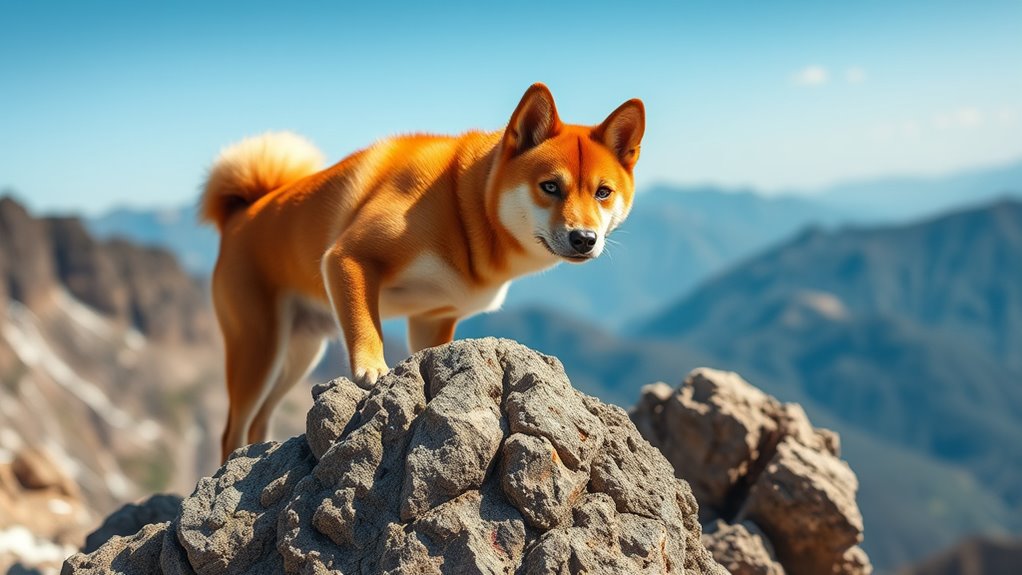
The Shiba Inu’s independent nature today can be traced directly to its history as a self-reliant hunting dog in ancient Japan. This breed was bred to work alone, which explains its strong-willed and autonomous traits. Early on, puppies needed early socialization to prevent aloofness, and grooming routines helped maintain their thick coats for outdoor survival. Their history influences how they respond to training and interact with strangers now. To better understand their behavior, consider this table:
| Trait | Historical Influence | Modern Behavior |
|---|---|---|
| Puppy socialization | Early hunting independence | May be cautious with strangers |
| Grooming routines | Coat maintenance for outdoors | Need regular grooming to prevent mats |
| Self-reliance | Solo hunting and guarding | Prefer independence in activities |
| Breed origins | Ancient Japanese lineage | Unique traits shaped by history |
Additionally, their training approach should emphasize patience and consistency, given their independent spirit. Acknowledging their independent nature helps in setting realistic expectations and building a strong bond. The breed’s history as a self-reliant hunting dog has contributed significantly to their cautious yet alert demeanor. Recognizing their history shapes a breed that values autonomy, making understanding their past essential to proper care today. Recognizing the importance of early socialization can also help mitigate potential aloofness as they mature.
Recognizing the Signs of an Independent Shiba Inu

Recognizing an independent Shiba Inu involves observing subtle behavioral cues that reflect its self-reliant nature. These dogs often display a strong sense of autonomy, making them less enthusiastic for constant attention. These traits are often seen in their independent spirit and tendency to prefer solitary activities. You might notice they prefer to explore on their own during walks or choose to initiate socialization techniques on their terms. They tend to have a confident attitude, sometimes seeming aloof with strangers yet loyal to their family. When it comes to grooming routines, an independent Shiba Inu may be more selective or resistant, emphasizing their desire for control. Watch for signs like minimal tail wagging when approached or a preference for solitary activities. These behaviors highlight their independent spirit and require respectful, patient engagement to build trust. Additionally, understanding their independent nature can help owners better meet their needs and foster a positive relationship. Recognizing these traits is essential for effective training and ensuring a harmonious bond. Being aware of their emotional independence can also assist in managing their social interactions and behavioral expectations, especially when considering separation from children or other family members.
Training Challenges Posed by a Strong-Willed Nature
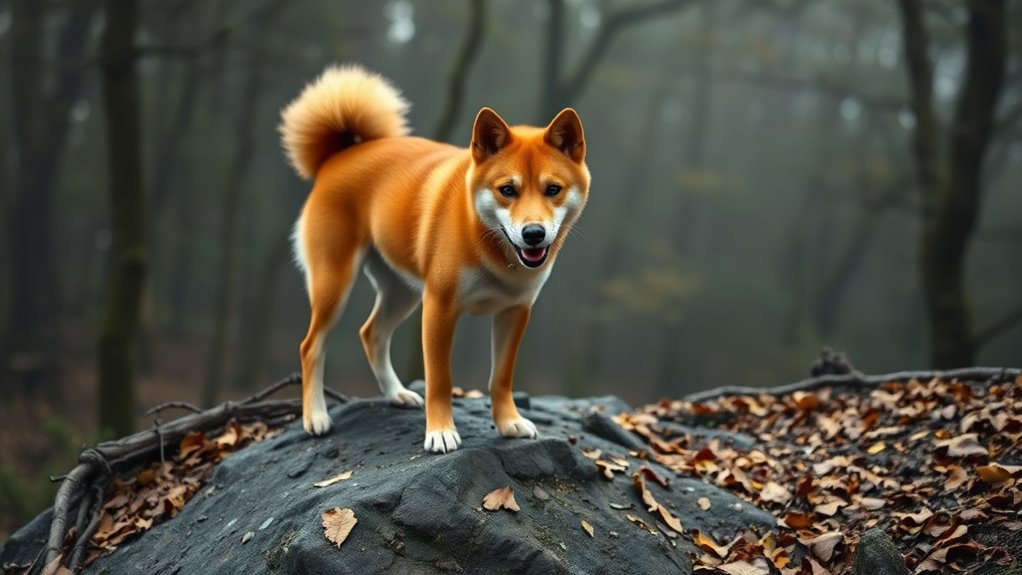
Because Shiba Inus are inherently strong-willed, training them often requires patience and consistency. They can be stubborn during socialization techniques, resisting commands or new experiences. Their independent spirit also makes grooming routines challenging; they may resist handling or grooming tasks. To succeed, you need a firm but gentle approach, rewarding good behavior consistently. Create a structured routine to build trust and reinforce boundaries. Use positive reinforcement to encourage cooperation, and be patient during setbacks. Remember, their stubbornness isn’t defiance but part of their nature. Additionally, understanding their independent nature can help tailor training approaches effectively. Recognizing their innate AI security traits, such as resilience and self-reliance, can also inform how to better communicate and establish mutual trust. Here’s a quick overview:
| Challenge | Solution | Tips |
|---|---|---|
| Resistance during socialization | Gradual exposure, positive reinforcement | Keep sessions short and consistent |
| Grooming resistance | Desensitization, praise, treats | Make grooming a positive experience |
| Stubbornness in training | Firm consistency, patience | Avoid harsh punishments |
| Independence during walks | Leash training, controlled outings | Use high-value treats |
| Handling commands | Repetition, patience, rewards | Stay calm and persistent |
Building a Bond With an Independent Dog
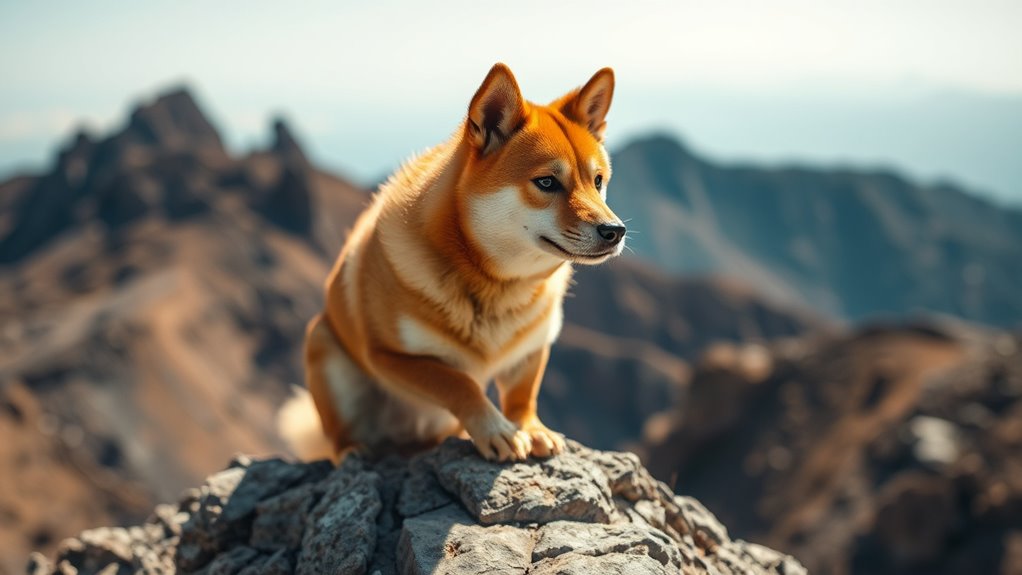
Building a strong bond with an independent dog like a Shiba Inu requires patience and understanding. You’ll need to respect their boundaries while gradually building trust through consistent interactions. Incorporate socialization strategies that introduce your dog to new people, environments, and other animals at their pace. This helps foster confidence without overwhelming them. Establish grooming routines to create positive associations, ensuring your Shiba Inu stays comfortable during brushing or nail trimming. To deepen your connection, focus on:
Building trust with your Shiba Inu takes patience, gentle socialization, and respect for their boundaries.
- Using gentle, positive reinforcement during socialization
- Keeping grooming sessions calm and short
- Respecting their signals when they need space
- Regularly engaging in low-pressure play to build trust
Providing Enrichment for the Spiritually Self-Sufficient Shiba Inu
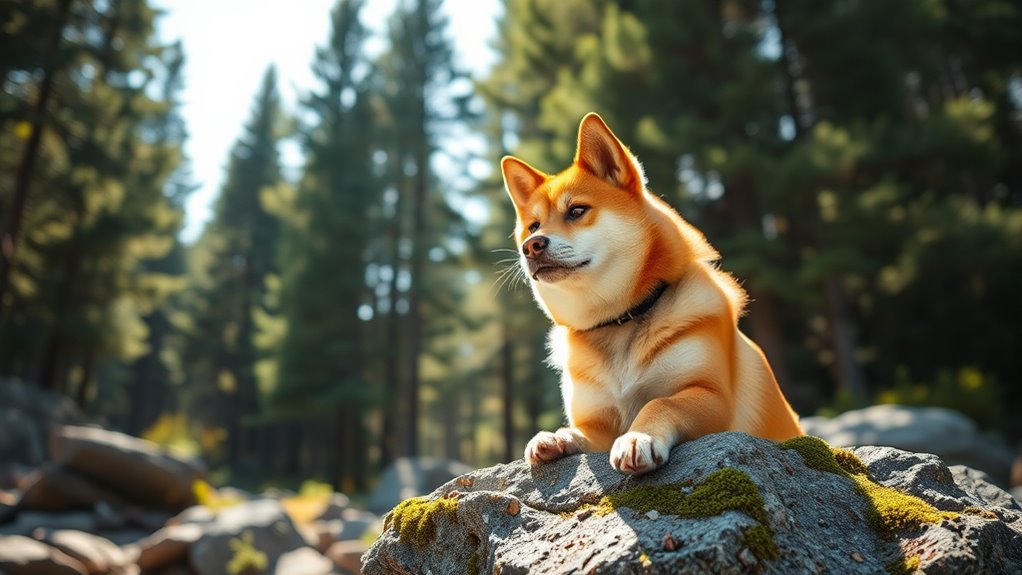
To keep your Shiba Inu engaged, offer mental challenges that stimulate their clever mind. Encourage independent play with puzzle toys or activities they can enjoy alone. By doing so, you support their self-sufficient spirit while preventing boredom.
Stimulating Mental Challenges
The Shiba Inu’s independent spirit thrives on mental stimulation that challenges its intelligence and curiosity. To keep your pup engaged, introduce activities that require problem-solving and focus. You can hide treats around the house, teach new commands, or introduce puzzle toys that align with its dietary needs. These challenges not only prevent boredom but also strengthen your bond. Remember, a mentally stimulated Shiba Inu is less likely to engage in destructive behaviors. Incorporate grooming routines as opportunities for mental engagement by making them positive experiences. Consider the dog’s natural instincts and provide enrichment that respects its self-sufficient nature. Activities should be varied and appropriately challenging to satisfy its independent, inquisitive mind.
Encouraging Independent Play
Encouraging independent play taps into the Shiba Inu’s natural self-sufficiency, allowing it to explore and entertain itself without constant supervision. To foster this behavior, incorporate socialization techniques that promote confidence around new toys and environments. Set up safe spaces with engaging toys and puzzle feeders to stimulate its curiosity. Regular grooming routines not only keep your dog healthy but also provide calm moments that reinforce independence. Encourage your Shiba Inu to play alone by gradually increasing time apart, rewarding its self-reliance with treats or praise. This approach helps build trust in its ability to entertain itself, reducing separation anxiety. By blending enriching activities with positive routines, you support your dog’s spirited independence while ensuring it feels secure and engaged.
The Importance of Respecting Their Autonomy

Because Shiba Inus highly value their independence, respecting their autonomy is essential for building a trusting relationship. Pushing them too hard during dog grooming or puppy socialization can cause frustration or mistrust. Instead, give them space to explore and decide when they’re comfortable. Recognize when they need a break or prefer to observe rather than engage. Respecting their boundaries fosters confidence and loyalty.
Respect your Shiba Inu’s independence to build trust and loyalty.
You can support their independence by:
- Allowing them to approach you during grooming instead of forcing contact
- Letting them set the pace during socialization sessions
- Avoiding over-scheduling activities and respecting their downtime
- Encouraging self-directed play to reinforce their autonomy
This approach ensures they feel secure and respected, strengthening your bond over time.
Managing Separation Anxiety in an Independent Breed
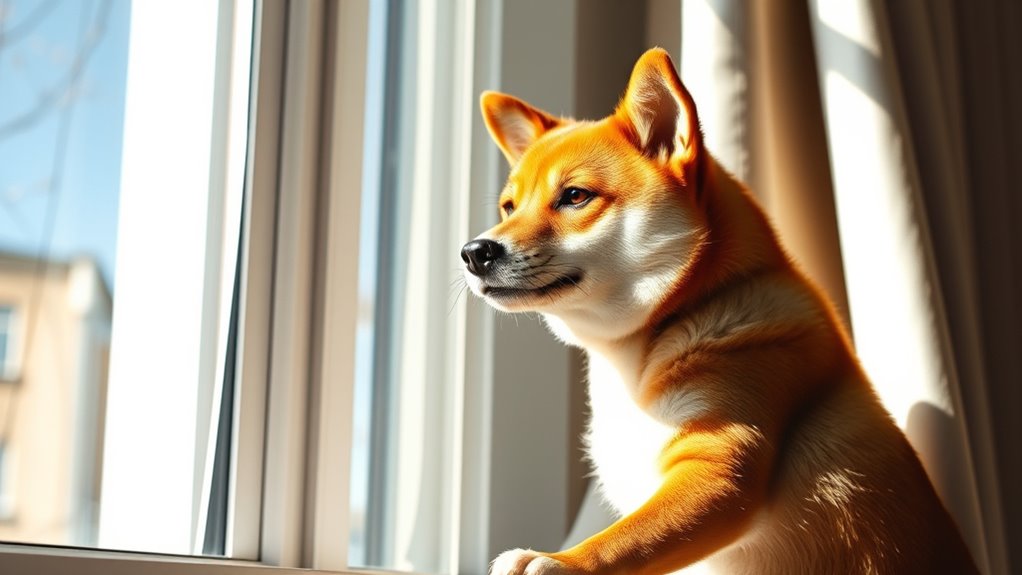
Managing separation anxiety in an independent breed like the Shiba Inu requires understanding their natural tendencies and providing thoughtful strategies. Start by implementing socialization strategies early, exposing your dog to different people, environments, and routines to build confidence. Gradually increase the time you spend apart, rewarding calm behavior and avoiding sudden departures that can trigger anxiety. Consistent grooming tips also help; regular grooming routines create a sense of stability and comfort, reducing stress when you’re away. Consider leaving a favorite toy or item that smells like you to comfort them. Keep departures and arrivals low-key to prevent excitement or sadness. Patience and consistency are key—over time, these methods can help your Shiba Inu become more comfortable when alone.
Tips for Living Harmoniously With a Self-Reliant Companion
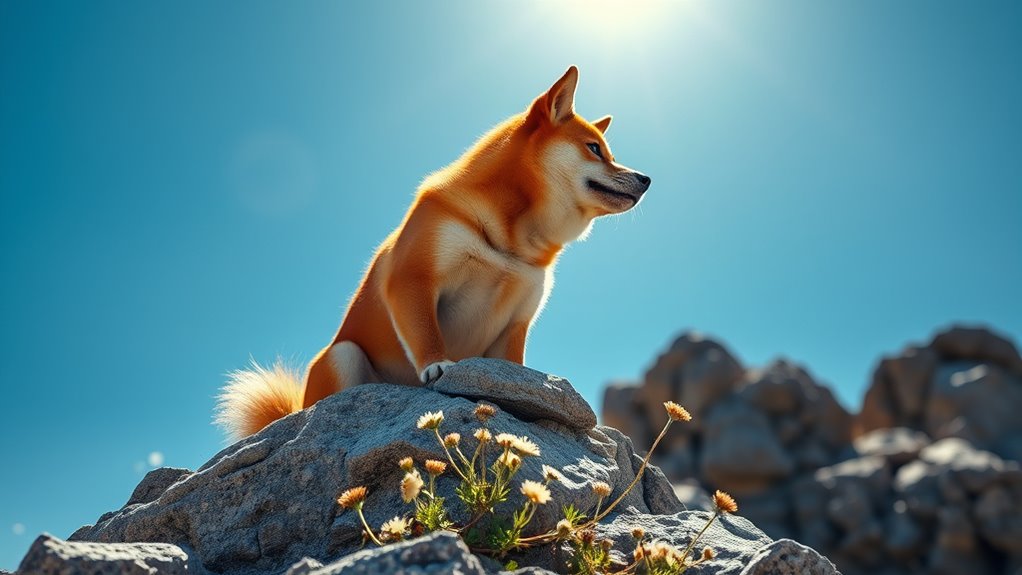
Living harmoniously with a self-reliant Shiba Inu involves respecting their independent nature while fostering a strong bond. To do this, establish consistent routines for grooming and dietary needs, which helps them feel secure. Keep grooming routines simple and regular, respecting their preference for minimal fuss. When it comes to dietary considerations, provide a balanced diet tailored to their age and activity level, avoiding sudden changes. Recognize their desire for autonomy by giving them space and avoiding excessive commands. To deepen your connection, engage in positive reinforcement during training and spend quality time together without forcing interaction. Remember, their independence means they thrive with patience and understanding, not constant supervision. This balance creates a trusting relationship that respects their unique personality.
Frequently Asked Questions
Can Shiba Inus Be Trained to Follow Commands Consistently?
You can train a Shiba Inu to follow commands consistently, but it requires patience and dedication. Their independence can lead to obedience challenges, so consistent training is key. Use positive reinforcement and short, focused sessions to build trust and encourage learning. Remember, consistency helps your Shiba understand expectations, making it easier to overcome their natural independence and develop better obedience over time.
How Do Shiba Inus Typically Interact With Children and Other Pets?
When wondering about your Shiba Inu’s social skills, consider their child interactions and pet compatibility. Shibas can be spirited and selective, but with proper patience, they often form friendly bonds with children, especially when introduced gradually. They can also coexist happily with other pets if socialized early. Keep an eye on playful pacts and protect boundaries, ensuring your Shiba’s snappy independence doesn’t overshadow their sweet side around kids and critters.
What Health Issues Are Common in Independent Breeds Like the Shiba Inu?
You should be aware that independent breeds like the Shiba Inu often face health issues such as hereditary conditions, including hip dysplasia and eye problems. They may also have dietary sensitivities, making it important to monitor their diet closely. Regular vet check-ups help catch potential issues early. By understanding these common health concerns, you can guarantee your dog stays healthy and happy while respecting its independent nature.
Are Shiba Inus Suitable for Apartment Living Given Their Independence?
You might wonder if a Shiba Inu’s independent behavior makes it suitable for apartment living. These dogs can adapt well if you provide consistent training, mental stimulation, and daily exercise. While their independence means they enjoy alone time, they still need social interaction and activity. With proper care and attention to their needs, Shiba Inus can be apartment-compatible, making them a good fit for active owners willing to meet their unique personality traits.
How Does a Shiba Inu’S Independence Affect Their Socialization Needs?
Did you know that 60% of Shiba Inu owners report their dogs are quite independent? Their independence means they set social boundaries easily, which affects their socialization needs. You should focus on consistent independence training to guarantee they’re comfortable around others. While they love their space, early socialization helps prevent aloofness. Understanding their nature helps you balance giving them freedom with guiding proper behavior for well-rounded social skills.
Conclusion
Understanding your Shiba Inu’s independence helps you build a stronger bond. For example, if your pup enjoys exploring solo, giving them safe space and respecting their autonomy keeps them happy and confident. Remember, patience and consistent training work wonders. Embrace their unique spirit, and you’ll find that a respectful, understanding approach creates a harmonious life together—one where both of you thrive and enjoy the journey.

